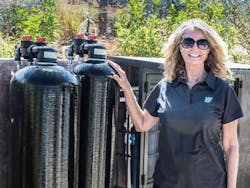About the author: Amy McIntosh is former managing editor of WQP. For more information, email [email protected].
As an American female owner of a water treatment equipment dealership in Baja California Sur, Mexico, Barbara Manfrediz considers herself to be “a bit of a novelty.”
Manfrediz moved to Mexico from Arizona in 2010 with no experience in the water treatment industry. Shortly after purchasing a water treatment system for her home, she was hired as a representative for the company that sold her the system. In March 2014, she opened her own business: Water Ways Baja. The dealership serves homes and businesses in the southern portion of the Baja California Peninsula.
“In essence, down here in the southernmost tip, we are more like an island. We experience similar water characteristics you would expect on an island,” Manfrediz said. “Our finite water supply, like our land, is fragile. Luckily, much of our local population is not only intelligent, but also very attached to the beauty and pristine nature that surrounds us.”
Water Ways Baja has one employee: Manfrediz. She acts as the company’s sole sales representative and performs all of the service herself. A number of local experts, many of whom are retired from the water treatment industry, volunteer their time to help Manfrediz continue to develop her knowledge about water treatment. Still, she is interested in expanding her staff to continue to grow the business.
“At first I don’t think I could have had any employees; I think it had to be just me,” she said. “But now I’m ready to grow, and the community is supportive of that. I would like to attract people [who] are interested in a career in paradise. I want the business to be more sustainable. I don’t want to be the business.”
Taming the Frontier
The dealership’s business is mostly residential, with a small-but-growing number of commercial clients. Manfrediz would like to expand the company’s commercial segment, but does not currently have the staff to handle the additional business.
Because of Baja Sur’s location, Manfrediz calls the water quality situation a “wild frontier.” In an area without governmental regulations or water treatment standards in place, it is important to monitor water quality to protect the health of residents. The region has a municipal water supply, but residents also obtain drinking water from other sources.
“In our area, agriculture is pretty common, and some farmers have permits for wells,” Manfrediz said. “They’ll store [water] in stock ponds and then distribute that water to various other properties. Some individuals enter into partnerships to obtain that water [from the farmers], and that’s the water they use in their house.” This water has to be treated to drinking water quality.
Another common issue Manfrediz faces is when customers purchase U.S.-made treatment systems online and install them themselves.
“These systems will typically work for a month, maybe two months, sometimes longer,” she said. “But eventually they stop functioning, and when they do function, the quality of the water they render is so poor that these people have basically just wasted their own time and money.” Manfrediz has learned the techniques required to make these systems successfully operate outside the U.S.
Help Along the Way
Manfrediz is a member of the Water Quality Assn. (WQA) and attended her first WQA Aquatech USA trade show in Las Vegas in April. There, she walked the exhibition floor with Charles “Chubb” Michaud—her WQA mentor.
“Every successful day I have in business, I owe to him,” Manfrediz said. “Without this amazing man’s encouragement, guidance and assistance, I could not be in this business in this place today. In my world, he is top of the heap.”
WQA’s mentoring program and networking opportunities, as well as educational programs and informational articles, have been vital tools that have helped Manfrediz grow her business.
“I view my WQA membership as a treasured asset and integral part of my personal development and success in business,” she said. “The WQA is a reputable resource where I can find answers, and because I am down here on my own, it feels like my personal connection to the industry.”
To market Water Ways Baja, Manfrediz relies mostly on word of mouth. Although she has advertised through traditional means in the past, Manfrediz finds that the demand ends up being more than she can handle on her own.
“I can’t be slicing things too thin, or else my standard of quality suffers,” she said. “It has to be a pretty high standard here, because if I mess up, people get sick. So I can’t mess up.”
The future of Water Ways Baja looks bright. With an influx of potential business on the horizon, Manfrediz remains on the lookout for knowledgeable additions to her team. Until then, she continues to expand her own knowledge and serve her customers. She also is focused on diversifying her product line to give her customers a broader range of options to meet cultural and economic needs. By understanding what her clients need, Manfrediz develops friendships with many of the people she does business with.
“If I had any advice for other dealers, it would be invest in quality products and let your integrity show. Consumers have many choices, and my experience is consumers make the choice to go with a professional they see as knowledgeable but [who] also operates with integrity,” Manfrediz said. “In the water treatment business, the client’s safety is paramount. I believe water treatment professionals have to hold [themselves] to a high standard of ethics. Consumers recognize, appreciate and buy from businesses they trust.”
Download: Here
